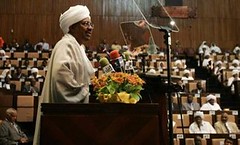
Sudan President Omar al-Bashir is fighting to maintain the sovereignty of his central African nation.
Originally uploaded by Pan-African News Wire File Photos
SUDAN APPROVES KEY ELECTORAL COMMISSION
Sudan's parliament on Monday approved an independent electoral commission, in a crucial but delayed step towards national polls laid out in the peace accord that ended 21 years of civil war.
The line-up of the nine-member commission, which was appointed by the presidency and submitted to parliament for approval, was passed by 298 votes to 12 objections more than three months behind schedule, said an AFP reporter.
The names were drawn up by the three-man Sudanese presidency, head of state Omar al-Beshir, First Vice President and leader of the semi-autonomous south Salva Kiir, and Vice President Ali Osman Taha, after lengthy negotiations.
The 2005 Comprehensive Peace Agreement (CPA), signed by north and south after a two-decade civil war, called for elections no later than 2009 as part of a democratic transition, but implementing the accord has hit major delays.
The commission is headed by Abel Alier, a former vice president of Sudan under Jaafar Nimeiri, from the Dinka tribe that dominates politics in the south.
He is a lawyer, political independent and human rights advocate who was once close to the legendary late southern rebel leader John Garang.
His deputy, Abdallah Ahmed Abdallah, is a professor of agriculture from Khartoum University who was also a regional governor under Nimeiri.
Two women were given positions on the commission, which will now be tasked with making all the provisions and setting a date for much-delayed elections.
Parliament approved the electoral law on July 7, two and a half years late, and one week before the International Criminal Court prosecutor sought Beshir's arrest on 10 counts of war crimes, crimes against humanity and genocide.
The electoral commission should have been appointed within a month of its approval and was therefore approved on Monday more than three months late.
Beshir has vowed that elections will be held on time, but many analysts argue that a formal arrest warrant could see him do everything possible to hold onto power, jeopardising the CPA which ended the longest civil war in Africa.
Sudan's new electoral law grants women 25 percent of the seats in parliament and introduces proportional representation by enshrining quotas for political parties in what has been billed a road towards democratic transformation.
Beshir seized power in a 1989 Islamist-backed coup that overthrew the democratically elected government. He won a new five-year term as president in Sudan's last national election in December 2000.
That election was boycotted by the opposition, and Beshir was first declared president after a 1996 poll widely denounced as fraudulent.
Complete democratic transformation in Sudan would also require major legal reform of legislation governing the media and national security.
Under the interim national constitution, set up after the 2005 peace agreement, all current MPs are appointed.
Beshir's National Congress Party (NCP) occupies 52 percent of seats and his former southern foes, the Sudan People's Liberation Movement which joined the national government as part of the peace deal, holds 28 percent.
Other political groups, including representatives from
conflict-strewn Darfur who signed a 2006 peace deal with the Khartoum government in Nigeria, account for 20 percent.
The ICC prosecutor accused Beshir on July 14 of allegedly ordering his forces to annihilate three non-Arab groups in Darfur, masterminding murder, torture, pillaging and using rape to commit genocide.
According to UN officials up to 300,000 people have died and more than 2.2 million have fled their homes since the conflict erupted in February 2003. Sudan says 10,000 have been killed.
No comments:
Post a Comment